CTET BIBLE: 8 Steps to Clear CTET Exam | How To Study For CTET - CTET & State TET PDF Download
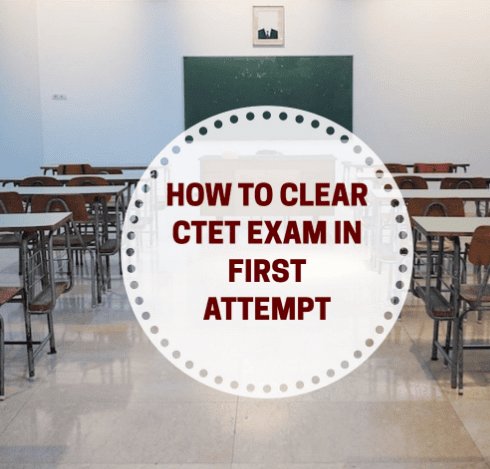
The Central Teacher Eligibility Test (CTET) is a crucial exam conducted by the Central Board of Secondary Education (CBSE) to determine the eligibility of prospective teachers. In 2025, more than 17lakh aspirants have applied for the exam and with each passing year, the competition is getting intense.
This EduRev guide for CTET Preparation has been designed to help lakhs of aspirants like you to prepare for the exam with the help of best available resources in the minimum possible time. It will help each of you to frame your own strategy and prepare for the exam accordingly.
Why did EduRev make this guide for CTET Aspirants?
- We wanted to answer the question "How to Prepare for CTET" once and for all in the best / perfect way possible for all the CTET Aspirants.
- Since students waste a large amount of time, effort, and money while preparing for CTET just because of a lack of the right direction. We believe it will be very valuable for every CTET aspirant.
- This guide was made to teach in a guided way so that you can clear your CTET exam with the least amount of time, effort, and money spent, by just making sure you Study What Matters. We did the hard work of building a strategy for your CTET Examination, so that you can achieve your dream.
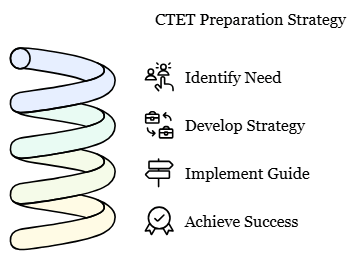
How was this guide made for CTET Aspirants?
- This guide was made by EduRev experts, with the research on interviews of the following students: Anurag Singh - 143/150, Parushi - 136/150 and Abbas - 131/150
- The experts of EduRev, who have cleared CTET and other teaching exams have also put in the efforts to make this guide and the study material available at EduRev for CTET preparation.

Let’s have a look at the full-proof STEP by STEP preparation strategy for preparing for the CTET / Teaching Exams at home.
Step 1: Understand the Exam & Syllabus
A thorough understanding of the CTET syllabus is the foundation of your preparation. The syllabus is divided into two papers:
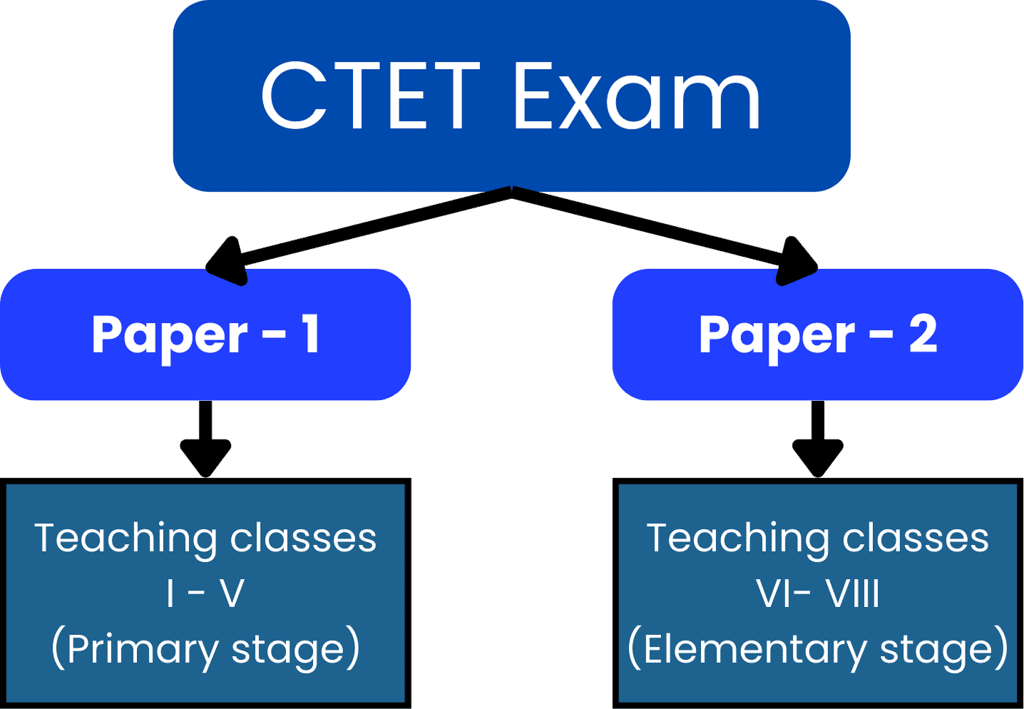
CTET Paper 1:
For candidates who wish to teach Classes 1 to 5.
- Child Development and Pedagogy
- Language I (Hindi)
- Language II (English)
- Mathematics
- Environmental Studies
CTET Paper 2:
For candidates who wish to teach Classes 6 to 8.
- Child Development and Pedagogy
- Language I (Hindi)
- Language II (English)
- Mathematics and Science (for Mathematics and Science teachers) or Social Studies/Social Science (for Social Studies/Social Science teachers)
You can find the Official Syllabus for CTET Exam here: Official Syllabus document
- Both papers (Paper 1 & Paper 2) comprise 150 multiple-choice questions (MCQs) to be attempted in 2.5 hours.
- Exam Format: Both papers consist of 150 multiple-choice questions, each carrying one mark. There is no negative marking.
- Sections: The Child Development and Pedagogy section is common to both papers, but the other sections differ based on the paper you are taking.
- Duration: Each paper is 2.5 hours long.
Step 2: Understand Previous Year Questions (PYQs)
CTET Previous Year Papers are an invaluable resource for exam preparation. They provide you with an opportunity to familiarize yourself with the exam format, question pattern, and marking scheme. By analyzing previous year’s papers, you can identify your strengths and weaknesses and focus on your preparation accordingly.
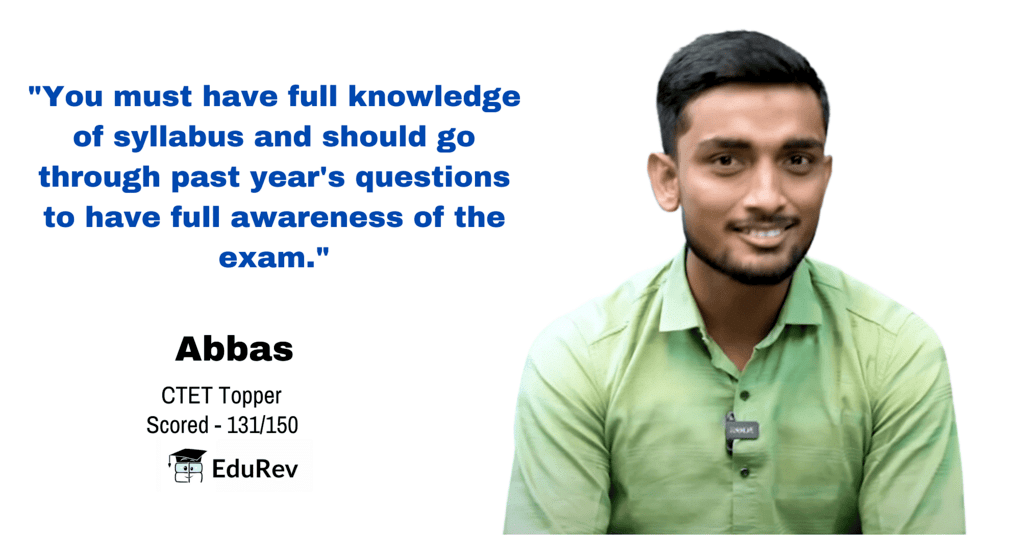
- Once you’re through the CTET Syllabus, pick up the previous year's papers and skim through them to get an understanding of what is actually asked in the CTET Exam. You can also analyse what sections are important for you and what are not in your CTET Syllabus.
- You need to devote 1-2 weeks to analyze the syllabus and PYQs alone, this will help you understand what CTET is asking and what is the demand.
- PYQs are important. You should look for that source that gives topic-wise questions of previous years. So that you can have a complete understanding of the topic and the type of questions asked.
- You should check out complete PYQs and subject-wise PYQs as well, while studying a particular subject. You can find 10-year Solved Previous Year Papers of CTET Exam here.
- Lastly, you can refer to them again as they are a good source of self-assessment in your CTET Preparation.
EduRev offers a course of CTET Previous Year Question Papers which provides unsolved and solved previous year question papers of CTET exam. You can check out this course here: CTET PYQs
Step 3: How to build your foundation with NCERTs
NCERT books are the cornerstone of your CTET preparation. They provide a solid foundation in the subjects covered in the exam:
- Child Development and Pedagogy: NCERT books on child psychology and pedagogy.
- Mathematics and Environmental Studies: NCERT textbooks from Classes I-VIII.
- Science/Social Studies: NCERT textbooks relevant to the specific topics mentioned in the syllabus.
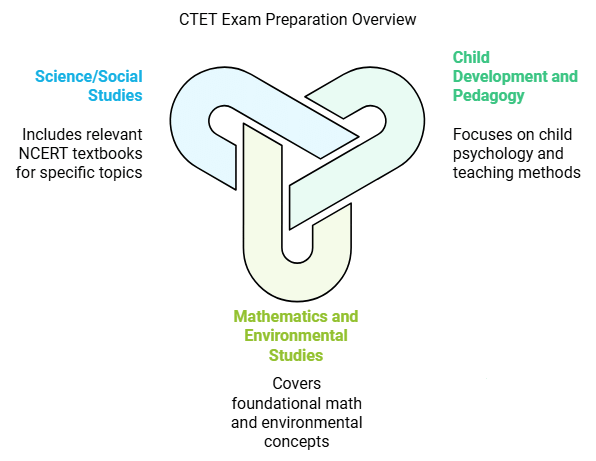
Thoroughly read and understand these books, as many questions in the CTET are directly based on NCERT content. EduRev has provided different courses and content to help you revise the NCERTs in a short span of time:
- NCERT based PPTs for Revision
- NCERT Video Summaries (English Language)
- NCERT Video Summaries (Hindi Language)
- NCERT Textbooks for Class 6 to Class 12
- NCERT Textbooks for Class 1 to Class 5
Step 4: Attempt Practice Tests Regularly for CTET Exam
Considering that CTET is a MCQ based exam, you should spend the majority of your time (70%-80%) of your preparation time on practicing tests. Practicing CTET MCQ tests subject-wise is crucial for several reasons. It enhances subject knowledge, improves exam pattern familiarity, identifies strengths and weaknesses, and reduces exam anxiety.
However, for the following subjects such as Environmental Studies, Hindi, English language, Mathematics, Reasoning, General awareness etc. Aspirants must also take a look at the child development and teaching methodology section to secure their jobs in the teaching sector.
EduRev courses are designed such that they offer video lectures, revision notes and MCQ Tests for each topic of the main subject and pedagogy. You can refer these courses and attempt MCQ Tests of different subjects:
- CDP (Child Development & Pedagogy)
- Mathematics & Pedagogy for Paper 1
- EVS & Pedagogy for Paper 1
- English Language & Pedagogy
- Hindi Language & Pedagogy
- Mathematics & Pedagogy for Paper 2
- Science & Pedagogy for Paper 2
- Social Studies & Pedagogy for Paper 2
Step 5: Attempt Mock Tests frequently
In the last 1-2 months leading up to the CTET exam, it’s crucial to immerse yourself in the mock test mode. Start taking mock test series and practicing with as many tests as possible. This will simulate the actual exam environment, helping you get used to the pressure and pace. As you acclimate to the exam conditions, your exam-time stress will significantly reduce.
- Mock tests are the single most effective tool for cracking the CTET exam. Practice one mock test daily in the morning, aligning with the exam schedule to train your brain to perform optimally during those hours. Consider joining flexible test series like the one at EduRev, where you can attempt tests at your convenience. You can find the Mock Test Series here.
- Regularly attempting mock tests from the CTET Mock Test Series will enhance your preparation. This series offers subject-wise, complete, and practice tests, allowing you to comprehensively assess your knowledge and skills. The more tests you attempt, the better your preparation will be.
- Develop your own strategy for taking mock tests. Determine whether you prioritize accuracy or speed and identify your strengths and weaknesses before the actual exam. By refining your approach, you'll be well-prepared to excel in the CTET exam.
How to Attempt Mock Tests for CTET?
- Solving mock tests within the time limit is a must. Learn to finish in time both Paper 1 and Paper 2 as per the given schedule.
- In the 2.5 hour period go through the questions thrice and mark absolutely sure questions in the first attempt, then those in which you have doubt, need to keep track of accuracy test series to help in achieving accuracy.
- Sit for an actual exam-like mock test at the same time.
- And then consistently stick to YOUR final paper-solving approach right till the end.
How to Analyze your CTET Mock Tests?
- Analysis of mock tests is absolutely necessary. Self-assessment is an essential part of CTET preparation.
- Ideally, analyze Mock tests ASAP after the test
- For wrong attempts, understand why you committed the mistakes
- Try to Identify topics/themes where you are going repeatedly wrong
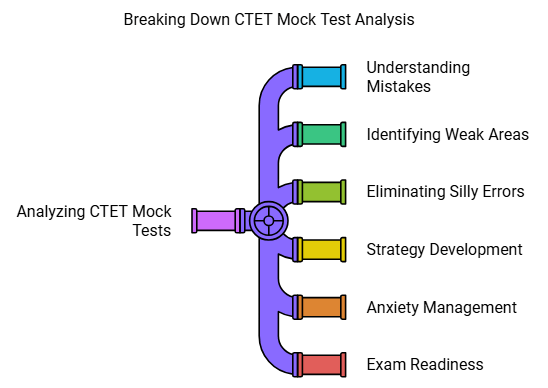
Go to your EduRev Profile (Analysis tab) to see your macro comprehensive analysis and see if you can pattern in the mistakes that you make.
- Work out ways to eliminate silly errors
- Never forget to analyze correctly attempted questions as well
- Brush up on the concepts of your weak areas that you may have missed
- This will help you in shaping YOUR approach/strategy and even identifying strengths and weaknesses.
- It will not only help you in anxiety management during the actual exam but will also prepare you extremely well for the exam!
Any new static knowledge gained should be added in your notes. And even for current affairs, maintain a separate diary and note down new things learned there.
Step 6: Standard Reference Books for CTET Preparation
Apart from the NCERTs, you need to also follow a few other advanced textbooks. But always remember you must check PYQs first and then check these books. In our analysis, we found the below common books that are recommended by almost all the top rankers. To save your time, we have linked them to the summaries for each.
- Child Development and Pedagogy: Arihant Publication
- Language I & II (Hindi and English): Arihant Publication
- Environmental Studies: Wiley Publication
- Mathematics and Science: Arihant Publication
- Social Studies/Social Science: Arihant Publication
Step 7: Subject-wise Strategy for CTET Exam
Each subject requires focused attention when preparing for the CTET exam. The subject-specific preparation tips outlined below will help candidates excel in the exam. By following these suggestions, candidates can enhance their preparation for each subject and improve their performance.
Child Development and Pedagogy
- Each component will include 15 questions related to child development.
- Questions in this section will be based on the philosophies and guiding principles of researchers. Some of them are given below:
- Inclusive Education: Understanding inclusive education and children with special needs is crucial, given the five issues addressed.
- Philosophers' Ideas: Be well-prepared on the ideas and guiding principles of various philosophers.
- Key Topics: Theories of Intelligence, Theories of Child Development, Learning Theories, Intelligence Theories, Assessment & Evaluation, Concepts of Psychology
Mathematics & Pedagogy for Paper 1 & Paper 2
- Study NCERT mathematics textbooks for classes I to V for Paper I, and VI to VIII for Paper II, as per the relevant paper code.
- Develop a strategy for tackling math problems in both Paper I and Paper II based on the essential criteria for teachers.
- Familiarize yourself with pedagogy-related questions, including practical teaching methods and formative as well as non-formative evaluation techniques.
- Your focus should be on attempting as many MCQ questions of the main subjects and pedagogy questions as possible. Since the subject involves practice & speed.
- You can find the courses of Mathematics & Pedagogy for Paper 1 & Paper 2 through these links.
- Expect 30 MCQ questions from the fundamental curriculum of classes VI to VIII.
- Study NCERT Materials: Review NCERT books for classes I to VIII for a strong performance.
- Be prepared for both teaching-related and real-world problem-solving questions.
Social Science / Social Studies & Pedagogy
- Address social science and environmental science content from classes I to VIII.
- This subject involves all the three sections: History, Geography and Social & Political Life
- It is recommended to make notes for a quick revision for all the theoretical subjects.
Environmental Studies (EVS) & Pedagogy
- Review NCERT books from Class I to V and Geography books from Class VI to VIII, as questions will cover broad and fundamental topics.
- It is a crucial subject for Paper 1, should be given enough attention to score well in this particular section of the exam.
Tips for Language Papers
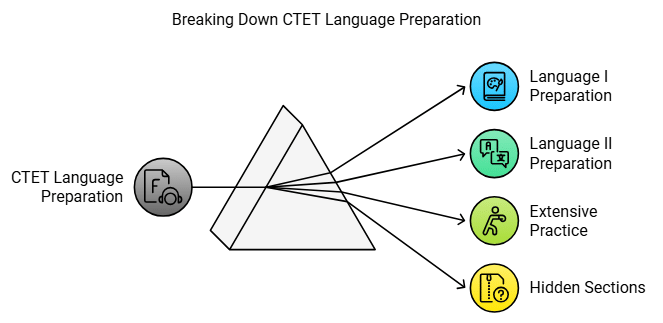
CTET Preparation Tips for Language 1
- Medium of Instruction: Language I will assess proficiency in the language used for classroom instruction.
- Extensive Practice: Regular practice is essential to master the Language I section.
- Hidden Sections: Prepare for two hidden sections—one prose and one drama. Questions can be scriptural, scientific, narrative, or discursive.
- Poem Question: Expect one question based on a poem in the question paper.
CTET Preparation Tips for Language 2
- Second Common Language: Language II is the second most common language in the area.
- Similar Format: The format of the questions will mirror that of Language I.
- Grammatical Competence: Questions will assess grammatical skills in Language II.
- Hidden Prose Questions: Be prepared for two hidden prose questions, which could be discourse, literary, narrative, or scientific.
Step 8: Believe in Yourself
- Without self-belief, you can not perform well in this exam even if you study a lot. Believe in yourself and be consistent. Don’t Forget, Consistency and discipline will take you places in the journey of clearing the CTET Examination.

- The journey is very difficult but if you have strong determination you will clear the exam. But prepare yourself for failures, there will be many. You just need to get up from each of them and walk towards your goal.
- So probably, the most important aspect at the end of your entire preparation journey is to stay positive. There are times when it can get quite hard/overwhelming but remember that happens to the best of top rankers. You just need to remove negative thoughts from your head and march forward towards your goal.

Frequently Asked Questions (FAQs) on CTET Exam
Q1: What is the CTET exam?
Ans: The Central Teacher Eligibility Test (CTET) is an exam conducted by the Central Board of Secondary Education (CBSE) in India to determine the eligibility of candidates for teaching positions in central government schools from Class I to VIII.
Q2: How often is the CTET exam conducted?
Ans: The CTET exam is typically conducted twice a year.
Q3: What is the exam pattern for the CTET?
Ans: The CTET exam consists of two papers: Paper I is for candidates who wish to teach Classes I to V, and Paper II is for candidates who wish to teach Classes VI to VIII. Each paper has 150 multiple-choice questions, with a total of 150 marks, and a duration of 2.5 hours.
Q4: What are the main subjects covered in the CTET exam?
Ans: The main subjects include Child Development and Pedagogy, Language I, Language II, Mathematics, Environmental Studies (for Paper I), and Social Studies/Social Science (for Paper II).
Q5: What is the validity period of the CTET certificate?
Ans: The CTET certificate is valid for a lifetime from the date of declaration of results.
|
1 videos|11 docs
|
FAQs on CTET BIBLE: 8 Steps to Clear CTET Exam - How To Study For CTET - CTET & State TET
| 1. How was this guide made for CTET Aspirants? |  |
| 2. Why did EduRev make this guide for CTET Aspirants? |  |
| 3. What is the importance of understanding the exam and syllabus in CTET preparation? |  |
| 4. Why is it recommended to attempt practice tests regularly for CTET Exam? |  |
| 5. How can subject-wise strategy for CTET Exam help aspirants in their preparation? |  |

















